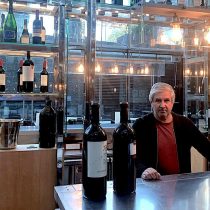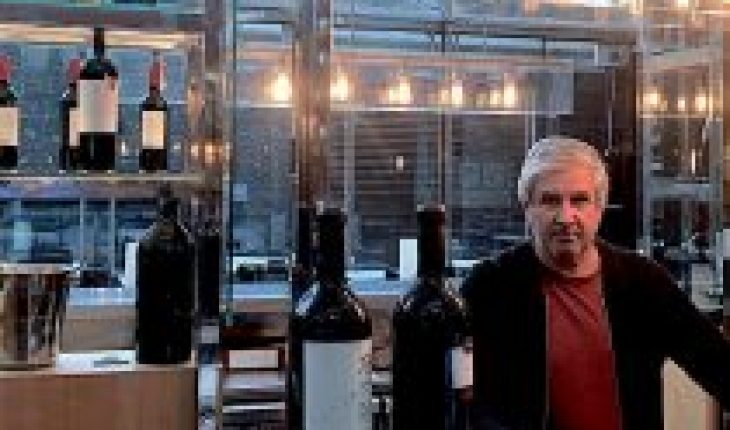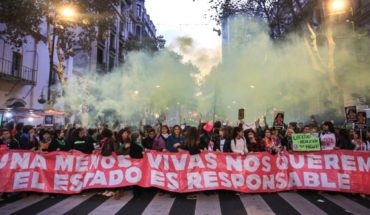
Antonio Fernández is one of the partners of Kilómetro 0, the emblematic bistro located in Isidora Goyenechea, in Las Condes. Some time ago, in an interview with El Mostrador, he warned that the pandemic was closing many businesses and the gastronomic world was seriously affected. Nor was there much opportunity with Fogape credits or economic measures to save the sector.
The place located underground of Hotel W had been transformed for years into a favorite of entrepreneurs and politicians. But the health crisis affected him hard, not having a terrace. He tried the delivery, but it wasn’t enough. Like many players in this industry, it is bankrupt for more than a year and a half without being able to open.
“Starting on October 18th with the social outburst, it led us to make the numbers very bad, we had closed, we had a curfew, with riders’ marches on weekends, we couldn’t get in, so from October onwards the serious problem started for us,” he warns.
Despite this he continued to try to survive with many difficulties in being able to pay for the rents and common expenses, which meant at least only in those expenses more than 20 million pesos per month to function.
“The restaurant operated for 10 years, being successful, where more than 10,000 people entered the restaurant alone in the month. Which made the building, real estate and funds very positive because that led to them visiting the W hotel, annex stores, etc.,” he says.
A light was seen at the beginning of March 2020, when they managed to stabilize and begin to recover. “But we can’t make it to 15 when the 18th finally gives us the stick of grace and tell us we have to close,” Fernandez recalls.
For both Kilometer 0 and the food industry in general it was an uncertain moment. “I’ve always been super positive so I thought this could last a couple of months, maybe we would resist and move on, but unfortunately this doesn’t end quickly, we’ve been in the same problem for over a year,” he says.
Advanced pandemic, health measures and planning of the Step-by-Step Plan allowed a partial reopening in some premises, but not in Kilometer 0. “In a restaurant where at that minute the appeal was that it was on the floor minus one, which made it very interesting, with a height of 28 meters. The minute the pandemic appeared, anything but one or locked up, I end up dying,” he explains.
“They quarantined us, shut us down and we could never open, we could have opened and fortunately we didn’t, exactly 20 days this year and a month, when we were in phase 3, which we could have opened with 25% capacity, a restaurant that has 500 square meters, is not profitable to open it,” he adds.
As they remained closed, the situation became increasingly complicated, because the lease and common expenses could not be paid. “My great effort was made, to try to have people as best as possible, by sending them to the AFC without firing them, paying what they could, because the real box there was. We made delivery, but it’s over, because, in fact, the I had to lease the real estate company, it cut off my light and that’s what it was like,” Fernandez confesses.
They decided to wait a little longer to keep trying to work “but you couldn’t. As for what was due at that minute, we may have made an agreement, closed earlier, but one takes it for granted that if it has been closed for six, seven, eight or ten months… I did not close to me I was closed by obligation, to me the state told me you have to close and I assumed that in addition the real estate that charges me the lease and the common expenses was going to tell me, as they are closed we will not charge you, but well that did not happen and continued to issue the lease bills month by month. Every closed month, you can understand that 22 million pesos per month, well in 10 months there are already 220 million.”
The inability to continue operating affected not only Kilometer 0, but the vast majority of the premises of the emblematic building. “Unfortunately the restaurant Gracia, which was next to us, was also closed the World of Wine which was an icon store here. We are closing, therefore this building is practically empty. Hotel W was also out of operation for a long time, with carts when it could be sold on the tsheds from the outside and nothing else. So today this is a building where I would say that 70% or 80% square meters of retail are closed.”
-Not the only restaurant that has closed. Les Assassins, Squadritto, among twenty premises in the Metropolitan Region have closed, in addition there are those from regions. In the face of this, did you feel any help from the government and the state to deal with this situation.
-The truth is that a principle, as I am optimistic, I effectively postulated everything that could be applied, to the Fogape credits by the State Bank, by my private bank, all the steps that had to be made were made, the papers that had to be presented were presented, they called me saying that I was pre-approved… but well, today it’s been 13 months and I’ve given up hope, because I never had any credit or help from the state.
In his minute I followed the President of the State Bank, Sebastian Sichel, I believed him quite a bit and thought this would be possible, but finally it was not, he showed me that these credits are aid, but not for the one who needs it. The one who needs it is the one that’s complicated and if they’re not going to give the money to which it’s complicated and they’re going to give it to the one with 10 points and all the clean papers, that’s no use to us.
Second, Minister Ignacio Briones at his minute, and he said it clearly, that many were going to break and that he was not there to help people he could not afford, therefore the gastronomy industry was harmed from day one with these aids.
Finally they did not help us, today there are no more than 50 restaurants that they can not pay and they are organizing their debts, but well that is what touched us, no one has helped us especially, great efforts have been made, groups have come together and others in order to save this industry, but the truth is that if one speaks even privately with one of the banks he told them that for the gastronomy industry there is no help , because they might not be able to afford it.
Now if these credits were 80% state-backed, it’s logical that they finally gave them to the people who needed it, but they didn’t. Today I’m like the whole industry, reinventing myself and seeing what I’m going to do to move on.
I’m reorganizing, you’re going to pay everything you have to pay, the suppliers have been excellent because they understand the situation, if I have to pay them in three or five years they’ll be paid, but nobody’s going to bankt or stop paying because they wanted to stop paying, we touched what we got and we hope to get up , to be on the market running. It should be remembered that for more than 10 years since we left, all commitments were always paid and we worked well, as a contribution to the building. We get the hard, good part of it, we’re going to have to get ahead somehow.





